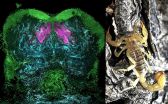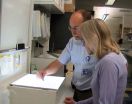(Press-News.org) Walter and Eliza Hall Institute researchers have for the first time revealed how dying cells are hidden from the immune 'police' that patrol the body.
The research answers a decades-old mystery about the death of cells, which in some situations can alert the immune system to potential danger, but in other circumstances occurs 'silently', unnoticed by immune cells.
Silent cell death, or apoptosis, is a controlled way for the body to eliminate cells that may be damaged, old, or surplus to the body's requirements, without causing collateral damage. This 'normal' cell death process is ignored by the immune system. In contrast, the death of cells at sites of infection or damage can alert the immune system to be on the lookout for danger.
Dr Michael White, Professor Benjamin Kile and colleagues from the institute have identified how apoptotic cell death is kept silent, in research published today in the journal Cell.
The team focused on the role of proteins called caspases, Dr White said. "Caspases hasten cell death by breaking down key components within the dying cell," he said. "Because apoptosis can still occur without the involvement of caspases, we investigated whether these proteins play any other role during cell death.
"We found that when cells undergo apoptosis without caspases, they release immune cell signaling molecules called interferons that set off the immune response.
"By dissecting the step-by-step process that occurs within dying cells, we showed one of the key roles of caspases is to suppress interferon release. This confirmed that caspases are crucial for hiding apoptotic cell death from the immune system."
Professor Kile said the discovery provided new insights into the links between cell death, the immune system and disease. "Our health relies on our immune system's ability to distinguish between the millions of cells that are supposed to die in our body every day to make space for new cells, and the unexpected death of cells that signals danger," he said. "The over-reaction of immune cells to apoptosis may be a factor contributing to inflammatory diseases such as rheumatoid arthritis.
The findings also provide important insights into how the body may tolerate potential new drugs, Professor Kile said. "Caspase-inhibiting medications are currently in clinical trials, for example being tested for their potential to keep cells alive during organ transplants. However, our work suggests that any use of these medications should be accompanied by careful monitoring of their effects on the immune system," Professor Kile said.
INFORMATION:
Dr White began the research as a PhD student enrolled through The University of Melbourne's Department of Medical Biology. The research was supported by the Leukaemia Foundation of Australia, Cancer Council Victoria, National Health and Medical Research Council of Australia, Australian Postgraduate Award scheme, Human Frontier Science Program (US), Sylvia and Charles Viertel Foundation, Australian Cancer Research Foundation and the Victorian Government.
This news release is available in Spanish. The genome is the cell's book of instructions. All the cells in our body contain the same genomic information but each of them "reads" the gene fragments that interest them in order to carry out their function. So, neurones, hepatocytes and cardiac cells are different although their genome is the same. In order to achieve this huge variety of functions from the same genome, the cells employ a mechanism known as alternative splicing. This enables them to combine several fragments - known as exons - from the same genes in order ...
Mountain View, Calif. - December 18, 2014 - 23andMe, Inc., the leading personal genetics company, today announced the publication of a study that pinpoints fine-scale differences in genetic ancestry of individuals from across the United States.
Since immigrants first arrived more than four hundred years ago, the United States has served as a meeting place for peoples from different continents. This study illuminates how American history and the ongoing mixing of peoples with African, European, and American origins can be seen in our DNA.
"The relationship between genomics ...
HOUSTON - (Dec. 18, 2014) - Cars that run on natural gas are touted as efficient and environmentally friendly, but getting enough gas onboard to make them practical is a hurdle. A new study led by researchers at Rice University promises to help.
Rather than shoehorn bulky high-pressure tanks like those used in buses and trucks into light vehicles, the Department of Energy (DOE) encourages scientists to look at new materials that can store compressed natural gas (CNG) at low pressure and at room temperature. Cage-like synthetic macromolecules called metal organic frameworks ...
LA JOLLA, CA--December 18, 2014--Collaborating scientists from The Scripps Research Institute (TSRI) and the University of California (UC) San Diego have developed a powerful new system for studying how proteins and other biological molecules form and lose their natural folded structures.
Using the new system, researchers can force a sample of molecules to unfold and refold by boosting and then dropping the temperature, so quickly that even some of the fastest molecular folding events can be tracked.
"One way of studying these structures has been to make them unfold ...
Whether you're cramming for an exam or just trying to remember where you put your car keys, learning and memory are critical functions that we constantly employ in daily life.
It turns out that the structure and function of brain centers responsible for learning and memory in a wide range of invertebrate species may possibly share the same fundamental characteristics, according to a new study published in the journal Current Biology and performed by University of Arizona neuroscientists Nicholas Strausfeld, Regents' Professor in the Department of Neuroscience, part of ...
ST. LOUIS - Saint Louis University research findings published in the December issue of Antimicrobial Agents and Chemotherapy report a family of molecules known as nucleotidyltransferase superfamily (NTS) enzyme inhibitors are promising candidates for new herpes virus treatments.
The findings could lead to new treatment options for herpes that patients can use in conjunction with or instead of currently approved anti-viral medications like Acyclovir. Researcher Lynda A. Morrison Ph.D., professor of Molecular Microbiology and Immunology at Saint Louis University, likened ...
Why are older people at higher risk for developing cancer? Prevailing opinion holds that, over time, your body's cells accumulate DNA damage and that eventually this damage catches up with the body in a way that causes cancer. A University of Colorado Cancer Center study published today in the journal Aging shows that this prevailing opinion is incomplete. In addition to DNA damage, cancer depends on the slow degradation of tissue that surrounds cancer cells, something that naturally comes with aging.
"It's really all about natural selection and survival of the fittest," ...
Illinois is the most critical hub in the network of U.S. domestic food transfers, according to a new study by Megan Konar, an assistant professor of civil and environmental engineering, and colleagues at the University of Illinois at Urbana-Champaign. The study was published in the journal Environmental Science and Technology.
Much like the national airport network in which O'Hare International Airport is a major hub, Illinois plays the most central role in distributing food across the U.S. According to the report, the U.S. food network moves more than 400 million tons ...
Doctors and nurses are traditionally thought to be the primary caretakers of patients in a typical hospital setting. But according to a study at the burn center intensive care unit at Loyola University Health System, three physicians, a social worker and a dietitian were documented as the most central communicators of the patient clinical team.
David Shoham, PhD, and colleagues were published in the American Burn Association's Journal of Burn Care & Research. Shoham is an associate professor in the Department of Public Health Sciences of Loyola University Chicago Stritch ...
Chicago, December 17, 2014--A poll of the Russian public, conducted by The Associated Press-NORC Center for Public Affairs Research, was released today. The poll, which includes a nationally representative in-person survey of 2,008 Russian adults taken between November 22 and December 7, 2014, found that President Vladimir Putin is extremely popular. Few say the economy is in good condition and most say that sanctions are hurting the Russian economy. Despite economic woes, most Russians believe their country is headed in the right direction. Most respondents are also optimistic ...




